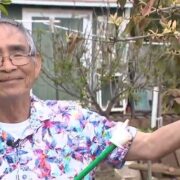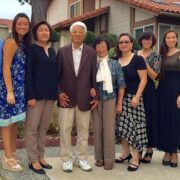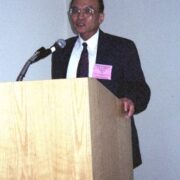Self Portrait of Tyzen Hsiao
27 years ago, when I was a student in Tokyo, every morning when I left the house I had to pass through the Ueno passage to Okachimachi to take the tram. At the corner of this street was small store; the shopkeeper, who always had a towel draped over his head, would greet me graciously and pass me a bottle of steamy hot milk and a piece of bread. He knew this was my daily breakfast. But one day, the store was closed, and I had no choice but to look for another shop. Yet how strange, they were all closed! Ah, of course – this was the first day of the year – Memorial Day. I thought, it couldn’t be that there was absolutely nothing to eat, could it? I walked several streets and eventually found my way back to the dorm, exhausted, and consumed nothing but tap water all day. I had never thought the Japanese were so devout about fasting and prayers on Shogatsu, Japanese New Year. This was my second small disaster related to Shogatsu in my life.
So what about the first time? It was my day of birth. Because of Shogatsu (Japan controlled Taiwan at the time), my mother couldn’t find an open hospital in Kaohsiung, so my father rushed my mother back to her home in Fengshan 鳳山so I could be delivered by my aunt. She was an excellent “midwife;” my aunt must have impressed this upon me a hundred times throughout these decades. Full of pride and self-gratification she’d say, “Tyzen, if I hadn’t saved you that day, you wouldn’t be alive today!” (it was a difficult birth). So, I was born in this unwelcoming time of Shogatsu.
I was the eldest child. In the eyes of my father – a doctor – Tyzen must also become a doctor in the future. This was a common attitude for Taiwanese to hold. However, because my mother was a pianist who had studied in Japan early on, I was around music from an early age, and I loved it. I remember my mother saying to me, “among the students I have taught, your reactions are the quickest, and you have the most natural talent!” It’s true; all parents in this world believe in genius of their own children. Well, don’t they face enough troubles?
I had already resolved my heart to devote my life to the world of music when I was in high school. This decision naturally set off a storm between father and son. Mr. Mingfu Tai, the principle of Tainan Changjung Senior High School at the time, was an old classmate of my father’s. He spoke frankly to my father, “If your son Tyzen becomes a doctor, he will just be an ordinary doctor, because his heart will not be in it. But if he studies music, he will become extraordinary!”
I am grateful to principle Tai for helping me out of my predicament, and I am grateful to my father for generously accepting his opinions. Finally, I stepped onto the road of no return of music. I feel my “student life” has never ended; indeed, there is a never-ending amount of homework to do and songs to write. On my journey of studying the piano, my first inspiration was my mother Hsueh-yun Lin Hsiao. Later, I was brought under the wing of famous teachers such as Jinhua Kao 高錦花, Tsimei Kao, Fumei Li, and Mingli Te. The thoughtful guidance Nakane Shinya at the Musashino Academy of Music in Japan and Dr. Nathan Stein at the University of California brought my piano performance to maturity. Yet my interest in composition was far more fervent than my desire to be a pianist, so starting from my time in Japan I began to research composition.
My composition teacher at National Taiwan Normal University (NTNU) was Professor Changhui Hsu 許常惠. He had just returned from the Western European cultural center of Paris and was full of enthusiasm; he wanted to bring the current of modern music to take root Taiwan and establish a new concept of modern Chinese music. Sure enough, his performance of his pieces in Taipei sparked huge reverberations. From then on, modern music entered the Taiwanese musical world. I was studying at NTNU at the time and had the great fortune of taking his class. Before this, I had written many little tunes, but it was just a kind of imitation and plagiarism (though this is also a necessary step in the process of learning). I remember the first class period when everyone was presenting their pieces in the classroom, my practice piece unexpectedly caught the attention of Professor Hsu. After this I soon became his private student. I remember I told him, “Professor Hsu, in my current situation I really can’t pay any extra tuition, how can I go to your home to learn composition?” “Relax!” He spoke to me with sincerity, “When I ask you to come it means you don’t need to pay tuition.” This kind of favorable encounter surprisingly happened to me again when I was in composition class at Musashino Academy of Music, when I became a private student of Professor Hideo Fujimoto, a famous contemporary Japanese composer.
In 1967 I returned to Taiwan after completing my study. I taught at many institutions, like the private Wenzao Ursuline University of Languages (then a women’s college), the music department at Tainan University of Technology, Tainan Theological College, and NTNU. My home was in Kaohsiung, but since I had the opportunity, I had to go north to Taipei teach, where I immediately sought guidance from Austrian musician Dr. Robert Scholz (蕭茲) for my studies in piano and composition. We had a teacher-student relationship, yet were close as father and son, tight as friends. I was deeply inspired by the composition techniques and piano artistry that he taught me. Fantasy Waltz, my piano duet that is now beloved by pianists and audiences all over the world, is the treasured piece I wrote in dedication to Dr. Robert Scholz in 1975.
In 1963 I married the Ms. Renzi Kao, a woman from a prominent family in Tainan. We had one daughter and three sons. In 1978 we all immigrated to the United States. My children have all received high quality higher education, for this I am grateful to God. In the past my wife had business difficulties and went through a tough time, just like “walking through the valley of death.” As of today, she has sacrificed everything for her beloved husband and children, and is struggling on her own in Taiwan with an incomparable willpower, enabling me to devote myself entirely to music. I must truly thank her for her support. Though she is not often by my side, she is always watching my back.
My “student life” continued; in 1983, under the guidance of the famous Dr. Kim at the University of California, Los Angeles, I completed a modern composition course at the graduate school, which caused a noticeable shift in my music. In terms of style, I still lean towards emotional romanticism, but the content and technique of my pieces are deeply embedded in the modern school, without losing the beautiful melodies and rich harmonies of romanticism. It was like opening a skylight and seeing the multitudes of stars filling the sky, I could not help myself but write one song after the other in praise of nature and life.
In the beginning of 1988, I completed the violin concerto that was known as the “Epic of Taiwan.” Music critic Jer-Shung (Hon-Tze) Lin once said, “This is a benchmark composition for Tyzen Hsiao. He has emerged from a folk musician to become a musician of the international stage.”
In 1989, I was honored to be recommended by the Southern California Seniors Association and receive the Humanities and Science Award from the Taiwanese-American Foundation. I also accepted a request from the Taiwanese United Fund (TUF) and completed a cello concerto and piano concerto respectively in 1990 and 1991. I hoped to leave behind cultural heritage for my Taiwanese descendants, and also earn a seat on the international music stage.
Recently a poster from my town of San Diego said, “November 13th, 14th, and 15th of this year, a historical concert comes to San Diego. For the first time, Taiwanese compositions are performed in collaboration with a world-class professional orchestra and the world-famous violinist Cho-Liang Lin. The Tyzen Hsiao violin concerto we are all awaiting will be eagerly received.”
At this time, I can feel my father and mother’s souls in heaven revealing proud smiles on their kindly faces.
(October 1992, Los Angeles)
Source: Record of Taiwanese American award recipients.
Translated from: 113. 蕭泰然自畫像 / 蕭泰然/2014/10 by Sky Ford
Posted 12/7/2020





